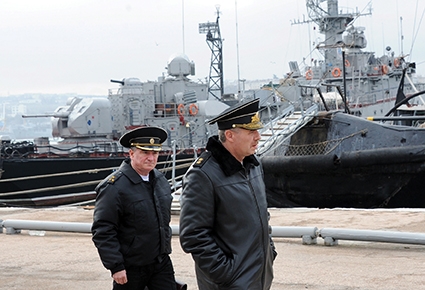Are Russia and NATO on a Collision Course around the Black Sea Region?
Op-ed
There is a feeling of disharmony as well as opposing views between NATO member states Bulgaria, Romania and Turkey about NATO’s military engagement in the region. Bucharest has advocated and continues to advocate a NATO Black Sea presence since early 2016, but the Romanian position has been met with opposition in a Bulgaria that did not want to be seen to be provoking Russia.
Back in February 2017, a spokesperson for the Bulgarian Ministry of Defense (MoD) confirmed that “Bulgaria had made no commitment to participate in a permanent Black Sea naval force.” However, she added that the navy will participate in several training exercises in the Black Sea, jointly with other NATO countries. And that, despite last year’s promise that Bulgaria agreed to send 400 soldiers to the multinational naval brigade in Romania.
At the same time, Turkey remains both reserved and cautious regarding its naval force participation. Yes, Turkey supports a limited and scaled-up NATO reinforcement of the Black Sea region, but as long as it doesn’t impact its interpretation of the Montreux Convention signed in 1936. Turkey may close its eyes to the extensive Russian militarization of the annexed Crimean Peninsula, yet it has stated that it does not recognize said annexation. The three NATO littoral are also wary of each other’s military presence in the Black Sea, since they continue to have disputes over fishing rights and other issues.
The aforementioned states remind us of famous Ivan Krylov’s fable “Swan, Pike and Crawfish”. In other words, when leaders of the three NATO countries cannot agree on a joint policy line and perceive Russia not as a spoiler but as one of the littoral state participants, they may be pushed to agree to a joint policy line if Russia provokes one or all of them. Can, for instance, Russia stage a cyberattack as a prelude to a potential military operation against them? Is such a scenario possible? The cyberattack may be seen as a rather innocuous operation that would give Russian leadership a clear answer whether or not they should go further and, for example, disrupt NATO naval operations in the Black Sea. At first glance, it is not expected that Russian leadership would be so short-sighted as to provoke NATO. However, at the same time, it can be said that all scenarios are feasible and nothing should be excluded. It should be remembered and emphasized that Russian politicians do not speak in terms of red lines and surprises like their counterparts in the West, but simply cross these lines and stage surprises after making their move.
In response to the increased NATO presence in the Black Sea, Alexander Grushko, Russian Envoy to NATO, said back in July 2016 that “the decision to increase NATO’s naval presence in the Black Sea is, in any case, yet another step towards escalating tensions in the regions of vital importance for Russia” and that Russia “reserved a right to respond accordingly”. Seven months later, Admiral Igor Kasatonov, former commander of the Black Sea Fleet, said in an article published in Izvestia on 21 February 2017: “Russia has all the necessary resources, both material and moral, to maintain supremacy on the Black Sea. Our fleet has enough force to oppose the NATO force in the Black Sea; the Black Sea Fleet dominates in the region.” Clearly, it has no intention of giving up its dominancy. And it only gets worse: according to the findings of a multi-national WIN/Gallup International poll published in February, Bulgaria, Greece, Slovenia and Turkey (NATO member states) chose Russia for their go-to-defense partner. As a result, the leaders of said countries wish to remain neutral. Thus, it can be said that Russia achieved its first tactical success in two of three NATO littoral states without shooting a bullet: by neutralizing them.
Russian calculations in terms of changing the balance of power in its favor and maintaining an upper hand in the Black Sea region differ from those of NATO. Russia is willing to dominate the Black Sea region, and not for nothing does it consider the region “of vital importance for Russia,” while NATO may be interested in maintaining a status quo in the region that may no longer be sustainable.
Further militarization of the Black Sea region, which Bulgaria and Turkey in particular do not approve of, does not absolve a Russia that is currently militarizing its presence there. Furthermore, Russian willingness to deploy forces to settle international disputes and thus achieve its strategic goals, plus the Russian military power disbalance, could lead Russia and NATO to the brink of a potential conflict.
The worst-case scenario sees a cyberattack on the three NATO littoral states accompanied by propaganda or a disinformation campaign broad in scope. Both campaigns are likely to be accompanied by a variety of economic sanctions, from impairing countries’ income from tourism, barring agriculture products, hacking banking institutions and perhaps to also undermining the national currencies in the three NATO littoral states.
If Putin’s administration decides on a collision course, the military operations put in motion would be swift, since planning for such operations has undoubtedly been done well in advance.
Eugene Kogan












